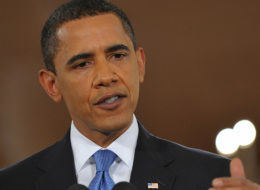In a powerful editorial just up on their website, the editors at America magazine decry the “sectarian Catholicism” that seems to be emerging, with the Notre Dame furor epitomizing the drift toward the insular self-righteousness of the Donatists of Saint Augustine’s day:
“The clouds roll with thunder, the House of the Lord shall be built throughout the earth, and these frogs sit in their marsh and croak–‘We are the only Christians!'” So wrote St. Augustine about the Donatists, a perfectionist North African sect that attempted to keep the church free of contamination by having no truck with Roman officialdom. In the United States today, self-appointed watchdogs of orthodoxy, like Randall Terry and the Cardinal Newman Society, push mightily for a pure church quite unlike the mixed community of saints and sinners–the Catholic Church–that Augustine championed. Like the Circumcellions of old, they thrive on slash-and-burn tactics; and they refuse to allow the church to be contaminated by contact with certain politicians.
For today’s sectarians, it is not adherence to the church’s doctrine on the evil of abortion that counts for orthodoxy, but adherence to a particular political program and fierce opposition to any proposal short of that program. They scorn Augustine’s inclusive, forgiving, big-church Catholics, who will not know which of them belongs to the City of God until God himself separates the tares from the wheat. Their tactics, and their attitudes, threaten the unity of the Catholic Church in the United States, the effectiveness of its mission and the credibility of its pro-life activities.
The sectarians’ targets are frequently Catholic universities and Catholic intellectuals who defend the richer, subtly nuanced, broad-tent Catholic tradition. Their most recent target has been the University of Notre Dame and its president, John Jenkins, C.S.C., who has invited President Barack Obama to offer the commencement address and receive an honorary degree at this year’s graduation.
Pope Benedict XVI has modeled a different attitude toward higher education. In 2008, the pope himself was prevented from speaking at Rome’s La Sapienza University by the intense opposition of some doctrinaire scientists. The Vatican later released his speech, in which he argued that “freedom from ecclesiastical and political authorities” is essential to the university’s “special role” in society. He asked, “What does the pope have to do or say to a university?” And he answered, “He certainly should not try to impose in an authoritarian manner his faith on others.”
The editorial concludes with four steps to avert this ancient heresy:
First, the bishops’ discipline about speakers and awards at Catholic institutions should be narrowed to exclude from platforms and awards only those Catholics who explicitly oppose formal Catholic teaching. Second, in politics we must reaffirm the distinction between the authoritative teaching of moral principles and legitimate prudential differences in applying principles to public life. Third, all sides should return to the teaching of the Second Vatican Council and Pope Paul VI that in politics there are usually several ways to attain the same goals. Finally, church leaders must promote the primacy of charity among Catholics who advocate different political options.
Read it all here.

